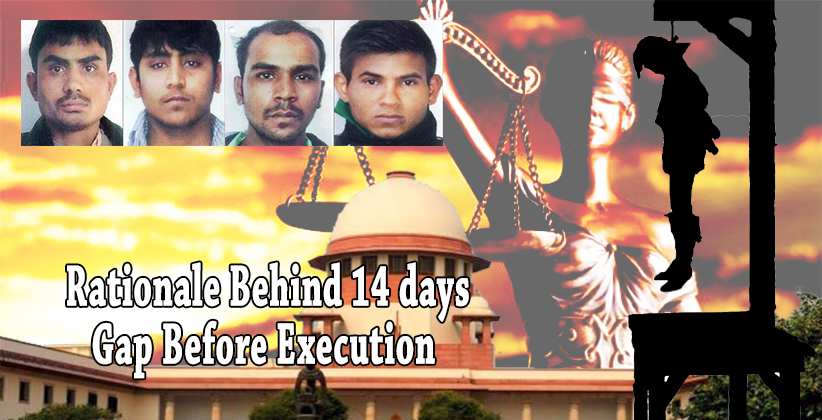The research article explores why SC has selected 14 days expressly for executing a death penalty after the denial of the plea of mercy and can it shorten this time to 7 days in the light of the unusual delay that has taken place in the hanging of the Nirbhaya rape and murder case convicts.
Looking at the current state of affairs in the Nirbhaya trial, the Supreme Court eventually upheld a death warrant against the four convicts to be executed at 6 a.m. on 3 March 2020. It's been more than seven years since the horrible incident took place, and until now there's been no complete justice for the victim and her family. Justice delayed is justice denied, but it is also true that justice hurried is justice buried. Even though we have an effective police and judicial system, it has taken us a lot of time to deal with this injustice. The first date of execution was originally 22 January 2020 but was postponed to 1 February 2020 by a court order of 17 January 2020. The convicts, with the aid of the lawyers, played the game of legal anomalies to turn the trial proceedings into a maze of various legal issues in order to nullify the impact of the Justice delivery mechanism of the country.
The 14-days time period concept originated from the case of Shatrughan Chauhan & Anr v. Union of India & Ors (2014 3 SCC 1). The court held that a total of 14 days notice had to be issued before the convicts could be executed. It is appropriate to stipulate a minimum period of 14 days between receipt of notice of the rejection of the petition and the date of execution of the petition for the following reasons - it helps the inmate to have a single and last encounter with the members of his family. It also helps family members of the inmates to make arrangements to come to the jail, which may be housed in a distant place, and to see the inmate for the last time. Despite sufficient notice of the scheduled date of death, the right of the inmates to have access to legal redress will be denied and they will be prevented from having a formal and last meeting with their relatives. It is the duty of the Superintendent of the Prison to ensure that the family members of the convict receive a message of rejection of the petition of mercy in due time. Most of the prisoners in the death row are extremely poor and do not have copies of their court papers, judgments, etc. These documents are required for the preparation of appeals, petitions for mercy and access to judicial remedies available to the prisoner pursuant to Article 21 of the Constitution. Since the availability of such documents is a necessary prerequisite for access to those rights, it is necessary for copies of the relevant documents to be provided to the prisoner within a week by the prison authorities to assist in making a petition of mercy and to petition the courts. This is the reason why a period of 14 days is granted to the convicts prior to their execution. The Ministry of Home Affairs has asked the Supreme Court to consider laying down a 7-days' rule instead of the previously allotted 14-days period to conduct execution of death row convicts after the rejection of their mercy please by the President. But in light of the above-mentioned rationale any time period below 14 days for the execution of death row convicts in general, does seem inhumane and impracticable.
Author: Harneet Singh







